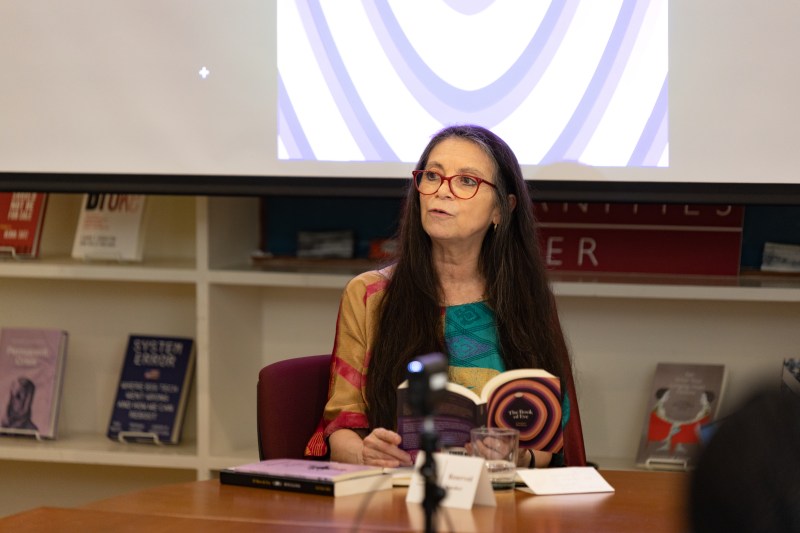The story of Adam and Eve is universally recognizable: Eve, “the first woman,” took a bite out of a forbidden fruit and ushered in humanity’s exile from the Garden of Eden. Mexican author Carmen Boullosa, who was raised Catholic, recently challenged that narrative.
Boullosa shared insights on her latest novel, “The Book of Eve,” in a book talk hosted by the Stanford Humanities Center on Oct. 6. The novel reimagines the story of Genesis from Eve’s perspective with a feminist lens, Boullosa said in conversation with Lisa Surwillo, associate professor of Iberian and Latin American cultures.
Boullosa revealed that she initially had little interest in writing a book about Eve.
“Eve, in the Book of Genesis: she speaks once, she acts once and she ruins us all,” Boullosa said. The author recounted she had always been far more attached to the “grand Mexican goddesses” of pre-Hispanic Latin America, who exhibited a sense of sensuality, ferocity and complexity that the Biblical character of Eve did not.
“As a Catholic-raised girl, instead of having this, I had Eve. Why?” Boullosa said.
This frustration spurred Boullosa’s search for more nuanced portrayals of the “first woman” and ultimately gave rise to her novel, “El Libro de Eva” (“The Book of Eve”), which was translated from Spanish into English in May of this year.
Boullosa’s novel presents Eve as a thoughtful, sensual and eloquent protagonist with the agency to tell her own narrative. Boullosa said this enables a re-examination our contemporary understanding of Eve’s role in the Bible: a subordinate to men and someone who brought ruin to humankind.
Boullosa read an excerpt from the novel in which Adam berates Eve for eating the “forbidden” fruit from the Tree of Knowledge: “But Adam,” one of Boullosa’s characters points out, “knowledge is a good thing […] How can you say that what Eve has given us is bad?”
Boullosa, who has published dozens of novels, poetry collections and plays in addition to “The Book of Eve,” is no stranger to works of fiction that re-examine traditional understandings of history and folklore. In a previous novel, “Texas: The Great Theft,” Boullosa revisited the American myth of how Texas was founded through a distinct Mexican perspective.
Mexican cultural identity also plays a significant role in “The Book of Eve.” Boullosa said the novel was “deeply Mexican, deeply Catholic Mexican,” and shared that the book was partially inspired from her childhood experiences in a missionary household. Boullosa described her parents, particularly her mother, as “radical” Catholics, which shaped her early understanding of religion and womanhood.
Audience member Rebeca Oliva, a first-year Ph.D. student in Iberian and Latin American cultures, resonated with Boullosa’s relationship with Mexican religion.
“I just feel like she captures so well the experience of being a Latina, raised Catholic, and not having images of strong women in our religion or iconography, even if our women are very strong,” Oliva said.
Boullosa, who serves as a distinguished lecturer at the City University of New York, also discussed her experience as a writer caught between Mexico and New York City. She described herself as someone who “always lives on a frontier,” whether as a Mexican living in the United States or as an accomplished woman writer in Mexico.
For many, the talk itself crossed frontiers, bringing together an audience of different nationalities, genders and academic backgrounds.
“The talk really shows the power of literature that transcends some of the things that we think about so often at Stanford as disciplinary boundaries,” Surwillo said. “Boullosa is an author that draws together people into a common area from such different perspectives.”
